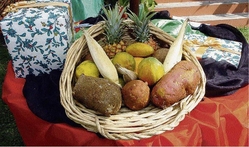Try Kwanzaa instead of Christmas
Published: Monday | December 21, 2009

Symbols of Kwanzaa on display at Ashanti Restaurant, Hope Gardens for the 2007 celebration. - Peta-Gaye Clachar/Staff Photographer
While Christians celebrate Christmas, many African-Americans celebrate Kwanzaa, which means first fruits, from December 26 to January 1.
Owner of Ashanti Oasis Vegetarian Restaurant, Yvonne Hope, and her family, have been celebrating Kwanzaa for many years. Ishiwawa Hope, daughter of Yvonne who is in her mid-30s, says she grew up seeing her family, who are Rastafarians and Afrocentric, celebrate Kwanzaa over the years. She explains that Kwanzaa is a holiday based on the African tradition of celebrating the harvesting of the first fruits. Kwanzaa was recreated and introduced to black people in the United States of America by California College professor Dr Maulana Ron Karenga in 1966. The celebration has now spread worldwide and is celebrated by millions of people in Africa, the Caribbean, Europe and America.
Kwanzaa is the time of year when black people get together as a community to celebrate the fruits of their labour during the past year. They do this by reflecting, reassessing, recommitting, rewarding and rejoicing in an atmosphere of peace, love and unity.
Hope says Kwanzaa is a seven-day celebration and each day stands for a different principle of the Nguzo Saba, the Seven Principles of Blackness. Each day of Kwanzaa, the family should gather to discuss the principle for the day, lighting a candle on the kinara (candleholder) for each day. "But some keep a Kwanzaa candlelighting ceremony on December 25, where they light all candles at once instead of a candle a day," says Hope.
The principles
December 26: She says the first day of Kwanzaa is called Ujoma, which represents unity, togetherness of family and the community.
December 27: The principle is called Kujicagulia which represents self-determination, the family and community-at-large interest.
December 28: Ujima represents collective work and responsibility with obligations to the past, present and future generations and the community.
December 29: Ujamaa is what Hope says the restaurant focuses on; this principle represents cooperative economics. This is when everyone works together for the economic good of the family and community.
December 30: The Nia principle represents personal examination and seeing how your personal goals can be beneficial to the community.
December 31: Kumba represents purpose. Each person shows creativity to strengthen the community and to be vibrant and energetic.
January 1: Imani represents faith, honouring the best of tradition, mankind and self so one can strive for a higher achievement.
Hope adds that the Kwanzaa celebration is very exciting. "Friends and family come together to celebrate in a big feast, and each person contributes something different from food, art, etc."
How to prepare for Kwanzaa
Before December 26, the family should work together to clean the house in preparation for Kwanzaa. Decorations with the colours red, black and green should be designed and displayed, such as Kwanzaa symbols, ankhs (a cross shaped like a T with a loop at the top), suns, kinaras or fruit baskets. Kwanzaa symbols should be arranged on a low table or the floor as follows:
(1) Spread a straw mat, or mkeka.
(2) Place the kinara (candle holder) in the centre of the mkeka.
(3) Place one ear of corn next to the kinara for each child in the family.
(4) Creatively place the gifts (zawadi), unity cup (kikombe) and a basket of fruit (mazao) on the mkeka.
(5) Place three red, three green and one black candle (mishumaa) in the kinara, with the black candle in the middle and three red candles on one side, three green on the other.
Fasting: Many people fast from sunrise to sunset to cleanse the body and discipline the mind.
Additional source: www.afriqueonline.com

Singer Marcia Griffiths (left), seems to have more than just musical talent as she has (from left) Terrence Francis, Empress Thunderous and Yvonne Hope in stitches during the Kwanzaa celebration at the Ashanti restaurant, Hope Gardens.


